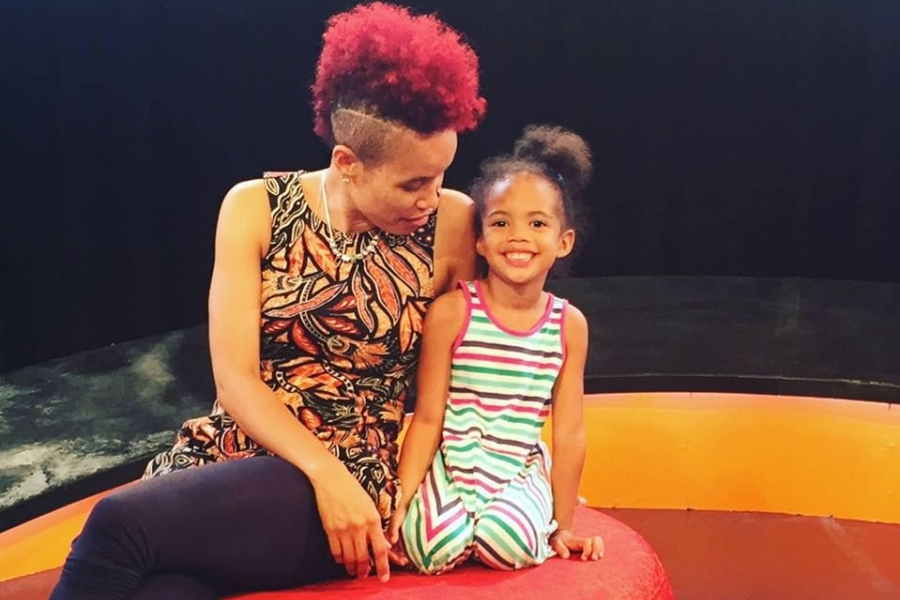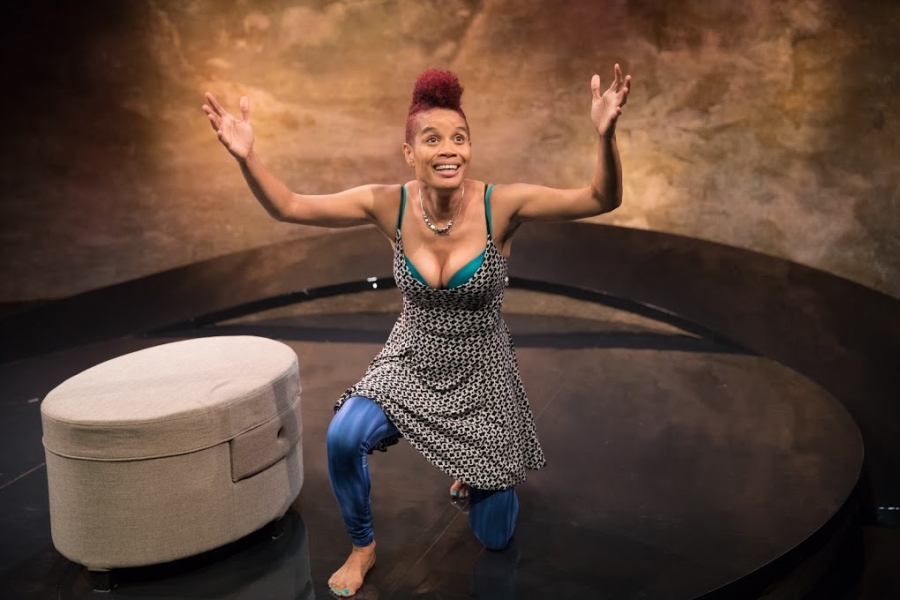Artist, author and activist Staceyann Chin is giving voice to her unique path to parenthood in “MotherStruck!” The one-woman show traces Chin’s efforts to have a child as a single lesbian, and the unique experiences she and her daughter have since faced. Chin will share her story with local audiences when she keynotes Philadelphia Family Pride’s annual conference later this month.
We spoke with Chin in advance of the conference about her work, her views on LGBT parenting and the motivation behind her Living Room protests — YouTube sessions she and her daughter produce about the everyday impact of social-justice issues.
PGN: How much has your life, personally and professionally, changed since your daughter was born?
SC: I can’t even tell you. Ask any parent. To date, I can’t remember any shift that has been as life-changing and meaningful. It’s everything all at once. It’s the most wonderful thing, the most challenging thing, the worst thing, the most surreal thing, the craziest thing. It’s the thing you’ve always wanted but it’s also the thing you never knew you always wanted.
PGN: Has “MotherStruck!” helped you in any way to deal with the challenges of motherhood?
SC: I don’t know if work helps me to deal with the challenges. I think the show is one place where I chronicle that story and where you get to connect with other parents. You get to commune with other people who have similar or different stories, but similar concerns. My work is always a place for me to deconstruct my life, to make sense of it, if you will. But the thing most parents tell you is that, as soon as you make sense of one thing, it’s shifting. I hear people with dogs talk about [them as their] babies. But once the dog is trained to go outside, your life is pretty much similar the rest of the dog’s life until it starts having health concerns. But I feel like I’m on some wonderful, amazing adult playground with a kid where, as soon as we master the swing, the playground morphs into an entirely different terrain. You’re like, “OK, we got the slide down now and then, oh my God, the monkey bars.” And then that grows into a giant Ferris wheel that’s going the wrong way. The show is a rye, hilarious vantage point from which to view family and parenthood. Even the most difficult of my memories I’ve tried to use my humor to tell it because it’s the only way we survive some of these more difficult talks. You have to laugh at them, laugh through them and laugh at the survival of them.
PGN: Your daughter is 5 now?
SC: She’ll tell you she’s 4 and three-quarters.

STACEYANN CHIN AND DAUGHTER ZURI
PGN: I saw some of the Living Room protests both of you participated in; how challenging is it for you to explain some of these big social concepts to her?
SC: I don’t think they’re big concepts. When you think of the concept of consent, kids deal with consent every day. Can a stranger pick me up? Can they grab my arm? The issue with Trump about him grabbing women in their most private parts without permission and they let him because he’s a star and he feels he’s a powerful man … I imagine one day my daughter will find herself in a space where someone wants to touch her in a way that doesn’t feel comfortable to her. I think the groundwork foundation in giving her the confidence and the awareness and the power to say no to such a person begins now. I want her to be a person who cares about the environment, who is kind to her friends, who knows how to chart boundaries around her body, to be able to participate in a partnership that requires compromise. All those things begin at birth. The last Living Room conversation was about when you can’t touch something you want to touch, and that’s a continuation of the first Living Room protest where she was talking about how she doesn’t want anybody picking her up. And at 2-and-a-half or 3, it’s about not wanting to be picked up, but now there are kids in her class who maybe want to pull her to go play with a toy she’s not interested in. Maybe next year it’ll be some kid in her class pulls her hair or a neighbor who consistently touches her face when she doesn’t want that. You have to continue the conversation. A lot of people think you can sit and have one conversation when it’s age-appropriate but you have to just find the right level of conversation to have with the kid at the level the kid is.
PGN: Why do you think organizations like Philadelphia Family Pride are important to both parents and kids?
SC: I think that groups that are not represented in mainstream narratives — in media and books and the way people talk about who we are as a species, whether that’s in church or whether it’s just in community spaces we share — need spaces where their specific concerns can be foregrounded. [LGBT parents are] a fairly new self-identified and organized group that is emerging alongside the concept of the modern, non-nuclear family. The nuclear family has dominated respectability in family politics for centuries. I think [LGBT family organizations] are so important because this is where we start to teach ourselves that what we are doing is beautiful, is wonderful and is just as much a cause for celebration as any heterosexual couple starting a family or being in a family. I feel like these spaces need to be called out, nurtured, celebrated, marked with conferences and discussions and picnics and talks and family meet-ups. That kind of space is imperative for opening up and taking advantage of this new definition of family so that the LGBT family can be squarely placed alongside this new emerging narrative of the non-nuclear family. They say that 50 percent of kids born to millennials are born outside of marriage, which means we are redefining what family is. But that’s what this is about: marching our species toward a more progressive way of being, a more progressive way of living. I tell people all the time that I don’t fight for the right to be gay or to be femme or the right for people to be immigrants; I fight for the right for people to choose what they can be. I’m not fighting for people’s rights to become gay parents, but to be treated as well as other human beings whatever choice they make: to partner with a person of the same sex, to have children, to not have children, to raise their sister’s kid — however a new family is created. And the queer family is just one in a plethora of new identities, new faces, new definitions of family. These families have always existed but they’ve been hidden, silenced, marginalized, erased or bullied and it’s time we all come out of the closet.
PGN: What’s next for you?
SC: I’m working on a children’s book, which is interesting because you really have to ask the question, How do you tell a story that is seen as adult material — about queerness as an identity or a parent struggling financially — to include the ear, eye and voice of the child? It comes back to the question about how I have conversations with my kid. Maybe we have to think about how we’re having conversations with each other. What kind of way are we having conversations so that children cannot be included in them? Is there something problematic in the way we’re talking to each other? We talk about queer identity as steeped in the sexual but we don’t talk about heterosexual identity as steeped in the sexual. An even more radical conversation is, Why do we not talk to our children about sex? None of us can be here without the context of sex so why are we not talking to our children about this thing from which they spring? Why not prepare them more so that we don’t end up with kids arriving at a college campus not having had any serious conversations about sex and getting into problems with sex and violence. And then we’re like, what happened? We haven’t been talking to them about sex at all and they’re thrust into this world where they have sex, alcohol, they can be out until whenever they want to. I think there’s something wrong fundamentally with how we’ve approached this conversation.
The seventh-annual Family Matters Conference is Oct. 29 at University of the Sciences. For more information, visit www.philadelphiafamilypride.org.
For more information on Staceyann Chin and “MotherStruck!” visit www.motherstruck.com.
